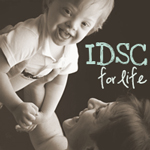I came across this study the other day when I was looking up some studies for someone who had emailed me.
As most of us who are very involved in DS know, there is a big methylation problem in DS. This is due to the overexpression of the CBS gene (as the abstract below states).
Some children with DS are unable to tolerate "methyl donors", which are certain supplements, or even food sources. To try to help "normalize" the effects of the overexpressed gene, we supplement with extra TMG, and Methylcobalamin B12. It would be good to supplement with extra Folinic Acid as well, but my brother is one of those who cannot handle certain methyl donors. He is able to take some (like TMG & MeB12), but not others.
If you want to know more about the whole methylation cycle, a good book is Methyl Magic by Craig Cooney.
Anyways, onto the study,
Infantino V, Castegna A, Iacobazzi F, Spera I, Scala I, Andria G, Iacobazzi V.
Department of Chemistry, University of Basilicata, 85100 Potenza, Italy.
Mol Genet Metab. 2011 Mar;102(3):378-82. Epub 2010 Dec 9.
Abstract
In Down's syndrome there is evidence that increased gene expression coding for specific cystathionine beta-synthase translates directly into biochemical aberrations, which result in a biochemical and metabolic imbalance of the methyl status. This event is destined to impact mitochondrial function since methylation is a necessary event in mitochondria and relies on the availability and uptake of the methyl donor S-adenosylmethionine. Indeed mitochondrial dysfunctions have been widely described in Down's syndrome, but they have never been correlated to a possible mitochondrial methyl unbalance. In the present study we find that the mitochondrial levels of S-adenosylmethionine are reduced in Down's syndrome compared to control cells demonstrating the effect of the methyl unbalance on mitochondria. The possible role of methylation in mitochondria is discussed and some preliminary results on a possible methylation target are presented.

Tweet























0 comments:
Post a Comment